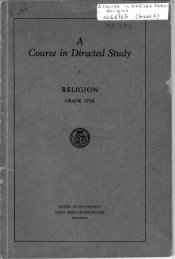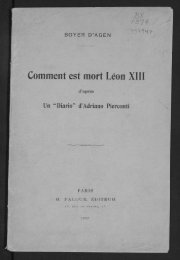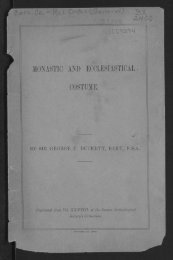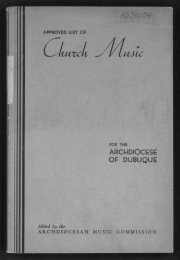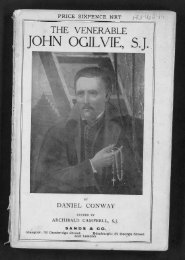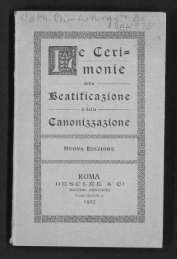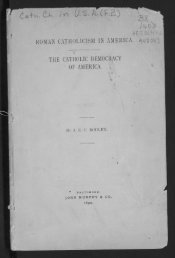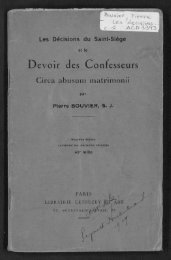Fabiola : or, The church of the catacombs - Digital Repository Services
Fabiola : or, The church of the catacombs - Digital Repository Services
Fabiola : or, The church of the catacombs - Digital Repository Services
You also want an ePaper? Increase the reach of your titles
YUMPU automatically turns print PDFs into web optimized ePapers that Google loves.
23 L TDIA.<br />
God, and <strong>of</strong> <strong>the</strong> same nature with <strong>the</strong> Fa<strong>the</strong>r and <strong>the</strong> Holy Ghost.<br />
Are you acquainted with <strong>the</strong> doctrine <strong>of</strong> <strong>the</strong> unity <strong>of</strong> God in <strong>the</strong><br />
Trinity?" Metella replied, "I know <strong>the</strong> Platonic doctrine <strong>of</strong><br />
ii existence; and I know also that Plato commanded us to<br />
swear by God, <strong>the</strong> disposer <strong>of</strong> all present and future things. I<br />
am ;i\vare also, that <strong>the</strong> Christians consider that <strong>the</strong> statue <strong>of</strong><br />
Jupiter at Elis, with its three heads, has some signification. But<br />
allow me to say what I think <strong>of</strong> such doctrines. I think that no<br />
m<strong>or</strong>tal is capable <strong>of</strong> comprehending <strong>the</strong> existence <strong>of</strong> <strong>the</strong> Divin-<br />
ity. Is not that a beautiful inscription that <strong>the</strong> Egyptians have<br />
written over <strong>the</strong> statue <strong>of</strong> <strong>the</strong> God at Sais,"* " I ani <strong>the</strong> All that<br />
has been, that is, and that is to be, and no m<strong>or</strong>tal has yet raised<br />
my veil.'<br />
' You ask me if I know <strong>the</strong> Christian doctrine <strong>of</strong> <strong>the</strong> Triune<br />
Deity. It could not have been explained to me in fewer w<strong>or</strong>ds,<br />
than I heard it not long since, by a comparison from my Chris-<br />
tian slave,<br />
' '<br />
God<br />
said she,<br />
'<br />
is one in His nature just like<br />
<strong>the</strong> tree; <strong>the</strong> roots, stem and branches <strong>of</strong> which are penetrated<br />
with <strong>the</strong> same existence. As <strong>the</strong> stem proceeds from <strong>the</strong> roots,<br />
so is <strong>the</strong> Son generated by <strong>the</strong> Fa<strong>the</strong>r, and as <strong>the</strong> branches <strong>of</strong> <strong>the</strong><br />
enjoys undoubted peace and feels himself supremely happy."<br />
" But what does this mean? " said she, "I saw him raise his<br />
hand and beckon to me so earnestly as if he would say .<br />
' Come<br />
to me.' Durst <strong>the</strong>n a hea<strong>the</strong>n ent<strong>or</strong> where those blessed beings<br />
1 '<br />
owdmg round <strong>the</strong>ir King? When he beckoned, he <strong>the</strong>reby<br />
expressed his happiness and a wish f<strong>or</strong> you to participate. To<br />
aiiiiin <strong>the</strong> height on which Christ had His throne, two thintrs<br />
deter you; and it appears to me that now I come nearer to <strong>the</strong><br />
meaning <strong>of</strong> <strong>the</strong> vision. By <strong>the</strong> dragon that you perceived on one<br />
side, and <strong>the</strong> owl on <strong>the</strong> o<strong>the</strong>r, <strong>the</strong> first signified, acc<strong>or</strong>ding to<br />
Plutarch Is. 9.<br />
our books <strong>of</strong> revelation, no o<strong>the</strong>r than <strong>the</strong> <strong>or</strong>igin <strong>of</strong> all evil, from <strong>the</strong><br />
beginning <strong>of</strong> <strong>the</strong> w<strong>or</strong>ld, whom we call Satan.* He tries to hold<br />
man down to <strong>the</strong> earth, leads him to sin, and tempts him to it,<br />
and those who give <strong>the</strong>mselves to his service, he brings at last<br />
altoge<strong>the</strong>r in one place, where <strong>the</strong>y are perpetually t<strong>or</strong>mented<br />
like your Tantalus, f He also seeks to deter you, he does not<br />
wish that you gain Christ and <strong>the</strong> happiness <strong>of</strong> Heaven. <strong>The</strong><br />
Redeemer has weakened <strong>the</strong> power <strong>of</strong> Satan, but has not<br />
entirely destroyed it; and <strong>the</strong>ref<strong>or</strong>e Satan resembles a wounded<br />
dragon, as you describe. But it is not he alone that separates<br />
you from Christ, <strong>the</strong>re is also ano<strong>the</strong>r hinderance which makes<br />
your union with Him difficult, and this is signified by <strong>the</strong> owl.<br />
Minerva, <strong>the</strong> goddess <strong>of</strong> wisdom, and <strong>the</strong> guardian <strong>of</strong> this our<br />
city, which is acknowledged to be <strong>the</strong> asylum <strong>of</strong> <strong>the</strong> intellectual,<br />
is represented by <strong>the</strong> owl. It signifies human wisdom, which is<br />
folly bef<strong>or</strong>e God. Philosophy endeav<strong>or</strong>s to acknowledge this<br />
contest, and would like to attain through its own strength, <strong>the</strong><br />
altitude <strong>of</strong> truth. But f<strong>or</strong> this its wings are too weak. Ol how<br />
modestly Plato expresses himself when he says: 'One must<br />
tree proceed from <strong>the</strong> stem and roots, so does <strong>the</strong> Holy Spirit<br />
proceed alike from <strong>the</strong> Fa<strong>the</strong>r and <strong>the</strong> Son.' Bui A<strong>the</strong>nag<strong>or</strong>as<br />
how ; many things can be made clear to us by comparisons.<br />
Allow me to expatiate a little longer on my comprehension <strong>of</strong><br />
<strong>the</strong> Divinity. Man is <strong>the</strong> w<strong>or</strong>ld in miniature, his body is <strong>the</strong><br />
picture <strong>of</strong> <strong>the</strong> earth, and his soul <strong>the</strong> reflection <strong>of</strong> <strong>the</strong> Divinity.<br />
Whoever has f<strong>or</strong>med <strong>the</strong> human body has taken <strong>the</strong> earth f<strong>or</strong> his<br />
model. We have a pro<strong>of</strong> <strong>of</strong> this in our own members our<br />
bones and flesh are <strong>of</strong> earth, our veins are <strong>the</strong> streams, <strong>the</strong> waters<br />
<strong>of</strong> which are called blood. <strong>The</strong> air is converted into breath,<br />
and in <strong>or</strong>der that <strong>the</strong> sun and moon may enlighten all this, and<br />
be reflected in <strong>the</strong> human body, he has given us eyes. But one<br />
remark m<strong>or</strong>e, A<strong>the</strong>nag<strong>or</strong>as, and <strong>the</strong>n I conclude. Of this magnificent<br />
body, this masterpiece <strong>of</strong> visible nature, an invisible<br />
spirit takes possession; governs it and penetrates it in all its<br />
parts, and this spirit is one. And so it may be one, and only<br />
one, who created this visible w<strong>or</strong>ld, and this one we call Jupiter<br />
Jupiter with his divine spirit and divine understanding. So<br />
you have ano<strong>the</strong>r comparsion. <strong>or</strong> if I may say so, m<strong>or</strong>e than a<br />
comparison a pro<strong>of</strong> <strong>of</strong> <strong>the</strong> unity <strong>of</strong> God."<br />
" You "<br />
are right," said A<strong>the</strong>nag<strong>or</strong>ns, and I participate in your<br />
views. We Christians, say also <strong>the</strong>re is only one God, as <strong>the</strong> soul<br />
<strong>of</strong> man is one; but have you f<strong>or</strong>gotten that this soul <strong>of</strong> man is a<br />
three in one? " " How so? " asked <strong>the</strong><br />
"<br />
hea<strong>the</strong>n. One" replied<br />
A<strong>the</strong>nag<strong>or</strong>as, ''<br />
is <strong>the</strong> mem<strong>or</strong>y, ano<strong>the</strong>r <strong>the</strong> understanding, and<br />
<strong>the</strong> third <strong>the</strong> will <strong>of</strong> man ; and yet our thinking, understanding<br />
and willing though three, are only one."<br />
Helena reflected "Oyes, I remember Plutarch also defended<br />
<strong>the</strong> three powers m man If <strong>the</strong> soul be created after <strong>the</strong> image<br />
<strong>of</strong> God, so also can <strong>the</strong> Trinity be already in <strong>the</strong> Soul, an <strong>or</strong>dering,<br />
willing and loving God. Possible also that our own hearts are a<br />
reflection <strong>of</strong> <strong>the</strong> heart <strong>of</strong> that loving Son, who out <strong>of</strong> pity f<strong>or</strong><br />
sinful man, as you say, took our nature upon Him, and became<br />
<strong>the</strong> Shepherd <strong>of</strong> <strong>the</strong> people. But let us return to this shepherd<br />
whom I saw m my dream. O lie looked so mild upon those<br />
who stood round Him! and so lovingly on my son. who clung to<br />
His feet! Tell me how did my Lucius obtain admittance into this<br />
divine company? "<br />
" "<br />
Perhaps,' replied A<strong>the</strong>nag<strong>or</strong>as, that your son, during this<br />
campaign, has made himself bring toge<strong>the</strong>r<br />
acquainted with Christianity, and<br />
has united himself with confidence to its Founder by which he<br />
<strong>the</strong> best <strong>of</strong> human pro<strong>of</strong>s, and <strong>the</strong>n venture upon<br />
<strong>the</strong>m as on a raft through <strong>the</strong> tide <strong>of</strong> life, but still he thinks one<br />
can sail m<strong>or</strong>e securely, and with less danger in a stronger ship-on<br />
a Divine W<strong>or</strong>d' \ This divine w<strong>or</strong>d, Christ has spoken, and this<br />
firm ship is <strong>the</strong> Church."<br />
" You must pardon me, A<strong>the</strong>nag<strong>or</strong>as, if just like an ign<strong>or</strong>ant<br />
child, I ask you many things about your system. What did you<br />
mean when you spoke <strong>of</strong> a bad principle and <strong>of</strong> a Tantalus, t<strong>or</strong>ment<br />
prepared f<strong>or</strong> <strong>the</strong> wicked?"<br />
"As <strong>the</strong> good," answered he, "will be one with God, <strong>the</strong><br />
source <strong>of</strong> good, f<strong>or</strong> all eternity, so must <strong>the</strong> wicked be with <strong>the</strong><br />
fa<strong>the</strong>r <strong>of</strong> wickedness, f<strong>or</strong> all eternity, and f<strong>or</strong> ever separated<br />
from God. As <strong>the</strong> reward <strong>of</strong> <strong>the</strong> good will be without end, so<br />
will punishment <strong>of</strong> <strong>the</strong> wicked be everlasting; and this is one <strong>of</strong><br />
<strong>the</strong> most imp<strong>or</strong>tant dogmas <strong>of</strong> Christianity."<br />
"In this respect," replied Metella, "Christ and Plato quite<br />
agree; both teach, that <strong>the</strong> good will be happy, and <strong>the</strong> wicked<br />
unhappy. Plato says :<br />
'<br />
Those who have led a pure and well<strong>or</strong>dered<br />
life, receive <strong>the</strong> gods as friends and guides, and dwell<br />
with <strong>the</strong>m-, while those, who on account <strong>of</strong> <strong>the</strong>ir greatness <strong>of</strong><br />
crimes remain impenitent, sink <strong>the</strong>ir fate in <strong>the</strong> well merited<br />
Tartarus, whence <strong>the</strong>y never m<strong>or</strong>e return.' But Plato mentions<br />
ano<strong>the</strong>r place, Acheron, whi<strong>the</strong>r all <strong>the</strong> imperfect were sent.<br />
' Those who are <strong>the</strong>re' said he, '<br />
will do penance f<strong>or</strong> <strong>the</strong>ir faults,<br />
and when <strong>the</strong>y are purified will be liberated' If <strong>the</strong>n <strong>the</strong>re<br />
are those different places, do you not believe that acc<strong>or</strong>ding to<br />
mv dream, my son will one day be counted among <strong>the</strong> blessed?<br />
f<strong>or</strong> you know I saw him near your God."<br />
" No doubt," replied<br />
" "<br />
A<strong>the</strong>nag<strong>or</strong>as. And I," said Metella, if I attend to <strong>the</strong> advice<br />
<strong>of</strong> Plato where he wills that no one shall change <strong>the</strong> religion <strong>of</strong><br />
his ancest<strong>or</strong>s, and remain a hea<strong>the</strong>n, do you believe that I shall<br />
one day be received iulo tliu Kingdom ot Ligiil where my sou feels<br />
himself so happy?"<br />
" When you have once learned what Christianity is, and by<br />
<strong>the</strong> means <strong>of</strong> grace have acknowledged it as <strong>the</strong> one truth, <strong>the</strong>n<br />
Metella, <strong>the</strong> Divinity and your own understanding will require<br />
from you to proclaim this truth openly, and not till this happens<br />
can you hope to attain this heavenly enjoyment; but if<br />
after this, you persevere in err<strong>or</strong> through a vain fear <strong>of</strong> man,<br />
you will never be one <strong>of</strong> that company, in which your<br />
you beheld<br />
son."<br />
"What, A<strong>the</strong>nag<strong>or</strong>as, do you think it possible, that a son<br />
could feel himself happy, if he thought that his mo<strong>the</strong>r were in<br />
eternal misery? Oh what a s<strong>or</strong>rowful happiness would that<br />
be f<strong>or</strong> my Lucius, to know that his mo<strong>the</strong>r was in a place <strong>of</strong><br />
t<strong>or</strong>ment! "<br />
"As <strong>the</strong> rain falling into <strong>the</strong> ocean, partakes <strong>of</strong> <strong>the</strong> quality <strong>of</strong><br />
* Apocalypse, c. K- 28,2.<br />
t Tantalus t<strong>or</strong>mented with a pnrching thirst bends to <strong>the</strong> wave which each<br />
time recedes from his lipe<br />
5SS.<br />
and returns as he removes his head. Odyssey, XI,<br />
J Semmias to Socrates in Plato's Phsedon.<br />
5 All <strong>the</strong>se three states are taken out <strong>or</strong> Plato's Pheedon.





